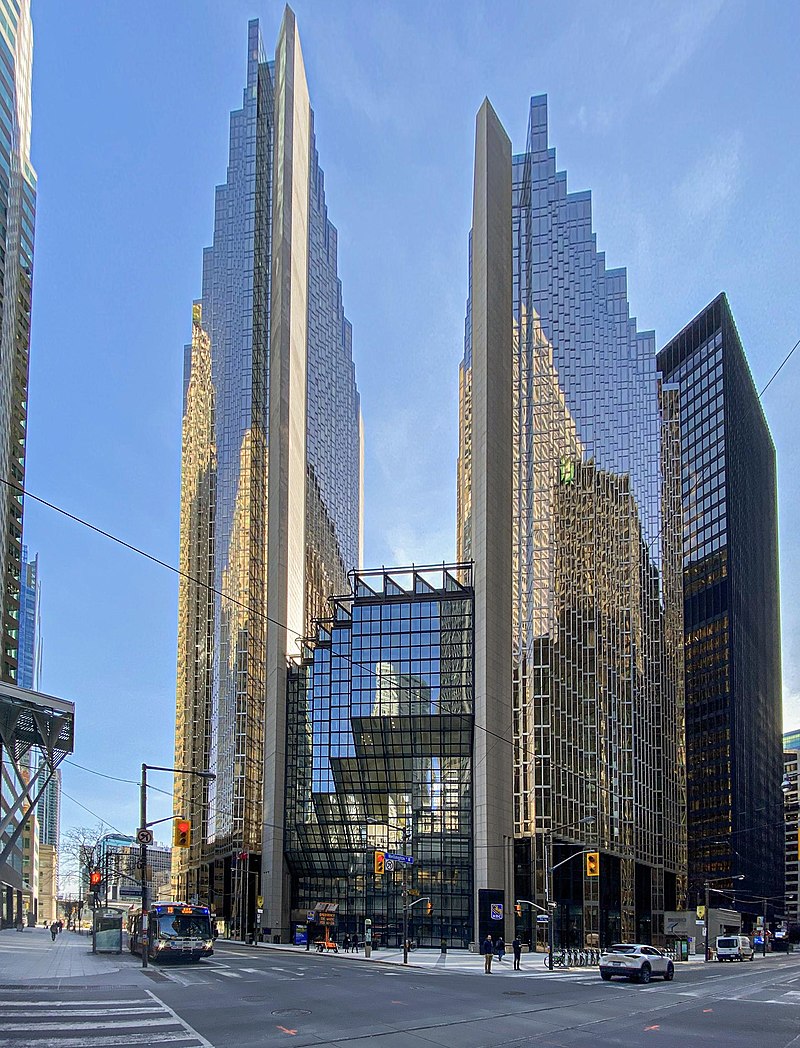Tapping Into Innovation - My Summer at Interac
Posted 01 September 2022Introduction
This post is a reflection on my term working at Interac’s Innovation Lab, located in Kitchener’s Communitech Hub. My supervisor was Goran Vukancic, my team lead and manager of the Innovation Lab.
About Interac
Interac Corporation is a Canadian interbank network that is responsible for linking the big five banks, as well as several small banks and credit unions. They’re known for Interac Direct Payment, the national debit card service that lets you pay via tap or chip, and Interac e-Transfer, the service that lets you send and receive money to anyone with an e-mail address and bank account in Canada. At the Innovation Lab, we focused on research and development into new payment capabilities, improving the way consumers and businesses move money, and exploring the future of payments.
 Interac HQ, located in the North Tower of the Royal Bank Plaza in downtown Toronto
Interac HQ, located in the North Tower of the Royal Bank Plaza in downtown Toronto
Job Description
As a Co-op Software Developer at the Innovation Lab, my focus was on exploring and developing new and emerging trends in the fintech world. This term, the lab focused on two ventures: NFTs and Weak Signals. In these two projects, we were gaining department-wide practical experience with new technologies to further Interac’s mission of helping people access and exchange their money.
This role came with many opportunities that allowed me to improve both my hard and soft skills. The team was tasked with building two projects from the ground up, which required skills in project planning, management, collaboration, and communication. I used Python, various data science libraries, MongoDB, React, Typescript, GitHub, Docker, and Jira throughout to implement and manage these projects.
The Innovation Lab is one big cross-functional team, with many of my co-workers spread across multiple business functions including legal, innovation, risk management, and more. This meant communicating technical concepts clearly to a non-technical audience in a meaningful way.
Working remotely presents unique challenge, especially when adapting to a new role and work environment. I had to take time to find what worked for me, make sure to take breaks, and communicate frequently with my team when I was having issues.
Work Term Goals
- Apply the Communitech design workshop principles to my daily work
At the beginning of the work term, the interns were placed in a week-long design workshop led by Communitech. The workshop focused on the key phases of the innovation lifecycle to set us up for success: researching, ideating, brainstorming, designing, and implementation. Throughout my work term, I was able to experience all five areas because both projects required performing multiple cycles of the innovation lifecycle. This allowed me to apply these concepts to what I learned in my software design classes.
- Ask my team for help more often to reduce gaps in my knowledge
In my previous work term, I received feedback that I need to improve communication with my team and let them know when I’m struggling with my work or facing a blocker. During this term, I brought up my questions and concerns more often to teammates. Communicating frequently resulted in having greater ownership of my work, which allowed me to push back or advocate for important decisions. By making this change, I found that I understood my work better, which led to higher efficiency and engagement.
 Group photo time, WFH style!
Group photo time, WFH style!
- Innovate fresh ideas on new projects to lead them into a successful trajectory
As my final goal, I wanted to play an active role in each step of the projects. This meant sharing my ideas in each meeting to move the project forward and validate my thoughts around the task at hand. I also elevated my teammates’ ideas by thinking outside the box to form better solutions. A major success of this goal was helping to kickstart the NFT project using my past experiences with cryptocurrencies.
Conclusion
My time at Interac was incredible, giving me valuable insights into fintech and software innovation. Through working with many new tools, technologies, and concepts, it helped me further understand what parts of software development interest me, such as project planning and management, which will help guide me into the next phase of my journey.
Acknowledgements
I’d like to thank all of the people that I met and worked with along the way. This includes the lab developer team that I worked with daily: Eric, Eleen, and Zhelong, and my managers for keeping our projects on track: Goran, Karam, Karan, and Zamir. I’d also like to thank the wider SIPES team for all the opportunities we got to collaborate: Aashi, Claudio, Dinaro, Florencia, Izabela, Karen, Kash, Kaylie, Kevin, Marc, Mohit, Oscar, Phil, Samah, and Sohrab. All of you made my final co-op work term an outstanding experience!